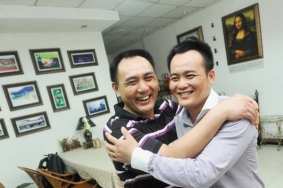
A man, who lost his son to human traffickers more than 20 years ago, was reunited with him last month. Father and son tell Xu Wei their stories in Chongqing.
For Hu Shangming, a major part of the last 21 years of his life was spent searching and waiting for his son, who was abducted by human traffickers. The 50-year-old resident of Chongqing municipality spent two years desperately looking for his son, who was abducted in January 1991.
After using up his savings in the quest, he decided to wait at the exact spot where his son was abducted in the hope that his son would find him there. "Over the years, I've turned from being a fruit vendor to running a teahouse, but I've not moved from the same location," Hu says.
In 2011, local police who were investigating human traffickers, reopened Hu's case. They took Hu's DNA sample to match those at the national DNA bank for abducted children. And that, ended Hu's wait.
Hu was reunited with his son in Xiamen, Fujian province, on June 2 this year.
"I knew I would find him one day," he says.
Even though it has been two decades, the memory of the day when his son was abducted remains fresh in Hu's mind.
Hu and his wife, both from Guang'an city of Sichuan province, used to run a fruit stall in Shapingba district of Chongqing.
"I was selling fruit along the streets while my wife was tending the stall," Hu recalls. "She was too busy to keep an eye on our boy and when she realized that he was missing, it was already too late," he says, adding that the couple moved to Chongqing in 1984.
His son was living in Guang'an with his grandparents and only joined the couple when he was 5. He was abducted a month after he came to Chongqing.
Hu suspected the culprit to be another hawker, Zhang Yonghong, who was selling fruit near his stall.
"I suspected him from the very beginning because only people who were familiar with the child could take him away," Hu adds.
Although police arrested Zhang and his two accomplices, and the local court convicted them, they were unable to locate Hu's child, who had been sold.
"I could not accept it. To me, my son is as precious as my life," he says.
Hu stopped work and dedicated two years of his life hunting for his son, including going to neighboring provinces.
"I was forced to stop looking because I ran out of savings. But I knew I could not move elsewhere in case he came back for us," says Hu, who declined job offers from friends to run supermarkets in other cities.
Over the years, the landscape where Hu conducted his business changed — roads were rebuilt and buildings were reconstructed. The spot where he used to run a fruit stall became a hawker-free zone. He decided to open a teahouse in the same location.
"I could just sneak down to take a look whenever I wanted," he says.
But his son did not appear as he had hoped. Still, his decision to stay was a wise one as local police reinvestigated the case after 20 years.
"We re-examined our case files as the Ministry of Public Security launched a nationwide campaign to crack down on child trafficking," says Yang Yongdong, head of the Shapingba police station, adding that initially, their greatest challenge was finding Hu.
"When he reported the case, he didn't leave any contact phone number or his address," Yang says.
Fortunately, after several days of intense inquiries, they found Hu and took a DNA sample for matching.
"When they told me there was a match, I could not sleep for several nights," says Hu, whose eyes turned moist remembering those eventful days.
He booked a flight to Xiamen even before the final results were released. When he arrived in Xiamen, he was not allowed to meet his son immediately, but Hu says he knew it was his son when police showed him a photo of Hu Yong, when he was 7.
According to Hu Yong, after he was abducted, he was sold to a rural family in Fujian. "I always knew I was adopted," says Hu Yong, who is now married with a son. When he was 14, his adoptive parents decided to report his case to the local police.
In 2009, Hu Yong had his DNA recorded in the national DNA bank of abducted children run by the non-governmental organization, Baby Come Home.
Hu Yong said he was also able to recognize his father when the two finally met.
"We look so similar and I knew he was my biological dad," he says.
Hu Yong, who has been a migrant worker, has decided to move to Chongqing to look for a job, to be close to his parents.
But he says he will maintain ties with his adoptive family, by visiting them during holidays and festivals.
"I'm really glad that I have found my real parents. At the same time, I'm equally grateful to my adoptive parents, who have always loved me as their own," Hu Yong says.
By Xu Wei
Source: chinadaily.com.cn
Related:
Lost and found






